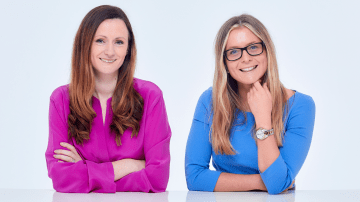With the backdrop of Go Sober for October, many of us are considering how cutting down or giving up alcohol could benefit both our physical and mental health. As part of our Wellbeing Wednesday series, Alcohol-Free drinks ambassador Andy Delaney explores our complicated relationship with alcohol and what it means to be ‘sober curious’.
“Just one for the road!” How many times have we heard that?
There are many occasions we find ourselves under pressure to have an alcoholic drink; it is to a certain extent woven into the fabric of our society. Every significant life event is typically intertwined with alcohol. From celebrations to commiserations, our life highs and lows are normalised by consuming alcohol to balance the flow. However, does this desire spring from an addiction to alcohol, habitual behaviours, something deep in our DNA or perhaps a cocktail of all three?
Our role models, schooling and family all influence the behaviours and character traits we take through to adulthood. Once grown up, we reflect a version of what has gone before with adjustments and refinements tailored to the unique ‘you’ that now exists. Drinking alcohol is one of the accepted, dare it be said, ‘default’ behaviours of being an adult, but with it comes many side effects that impact and affect our society.
In some cases, people can moderate their drinking, others enjoy the pleasure that comes with consuming alcohol, then there is the other side of alcohol consumption which is detrimental not just to the consumer but also to others and the wider community.
The relationship between alcohol, mental health and wellbeing is a complex matter; an alcoholic drink can initially make you feel better, help you to feel confident or relaxed in social settings, or take your mind off things. However, drinking too much or too often can have the opposite effect on your mood and mental wellbeing. Anxiety and depression are more common in heavy drinkers and heavy drinking is more common in those with anxiety and depression.
Consuming Alcohol is known to be the cause of over 60 different types of disease and medical conditions all having a potentially long-term impact on your health.
In most cases these can be addressed by moderating or abstaining from alcohol. Being mindful and assessing the relationship you have with drinking can be a great place to start. Are there social, economic, or medical issues in your life, that if the consumption of alcohol was reduced or even removed would be improved? In short, could cutting down on alcohol have a positive impact on your wellbeing?
Due to recent global events, our health and mental wellbeing have been tested more so than at any other time in our generation. Our daily rituals, behaviours, and habits have all been disrupted and the impact of this will have a long-lasting effect for many people. During the Covid period, alcohol consumption increased by over 21%. As we enter the post-Covid world, many people are conscious that this increase might not have served them well and are looking for ways to address it.
As a society we are seeing many cultural shifts around alcohol and its consumption. Both Millennials and GenZ are drinking significantly less than their older counterparts and are much more sober curious, being generally more focused on their wellbeing and mental health. Over 70% of GenZ feel ‘binge’ drinking is a ‘risky’ activity and 41% associate alcohol with ‘depression’ and ‘anxiety’. The younger generation are much more conscious of image and control, with 49% of GenZ aware and conscious of their online image and 76% feeling it’s important to always stay in control.
The sober curious movement is gaining significant global traction, with Sober October, Dry January and Dry July leading the charge.
These periodic events provide a great opportunity for you to take a break and see the positive benefits that not drinking alcohol can bring. The mind-set of society is shifting and alcohol free (AF) drinks are now more accessible than ever. Globally, there are now 1000’s of alcohol-free drinks available, alcohol-free events are becoming more popular to avoid the ‘drunk’ groups and unruly behaviour that alcohol can provoke, dedicated AF shops are selling new alcohol alternatives such as kombucha and health drinks, as well as alcohol replacements. Bars, hospitality and retail venues are all starting to embrace this new industry and provide healthier options for their consumers.
The mind-set of society is shifting and alcohol free (AF) drinks are now more accessible than ever. Globally, there are now 1000’s of alcohol-free drinks available, alcohol-free events are becoming more popular to avoid the ‘drunk’ groups and unruly behaviour that alcohol can provoke, dedicated AF shops are selling new alcohol alternatives such as kombucha and health drinks, as well as alcohol replacements. Bars, hospitality and retail venues are all starting to embrace this new industry and provide healthier options for their consumers.
After a lifetime of drinking, reducing consumption or abstaining can be a challenging process, but there are now many tools and support networks to help on your sober curious journey. Club Soda in the UK empowers people to rethink their approach to alcohol with online courses and events. Locally we have Sober Jo, a key advocate in the AF drinks industry who runs a series of sober programmes to help people on their sober journeys, and ClubAF provides social and corporate tastings along with pop-up bars allowing people to try before they buy.
Have you considered what being ‘sober curious’ could mean to you, how being more mindful about your alcohol consumption could impact your life and the positive impact it could have on your health and mental wellbeing?
Andy is an Alcohol-Free drinks ambassador embracing all aspects of the AF drinks industry through talks, pop up events and his Jersey based eCommerce platform ClubAF. Recently celebrating 1000 days sober, Andy continues to look for new drinks to enjoy and to share them with Jersey’s mindful drinkers. Andy’s mission is to expand the Alcohol Free drinks choices available in Jersey, providing better choices across hospitality & retail, enabling consumers to make healthier lifestyle choices providing a positive impact on their mental health and wellbeing.
Click here to go to our Wellbeing section…
… and click here to subscribe to our daily newsletter – meaning you will never miss a thing.















